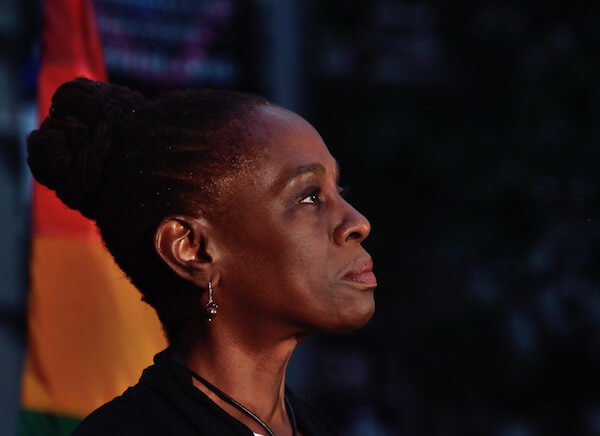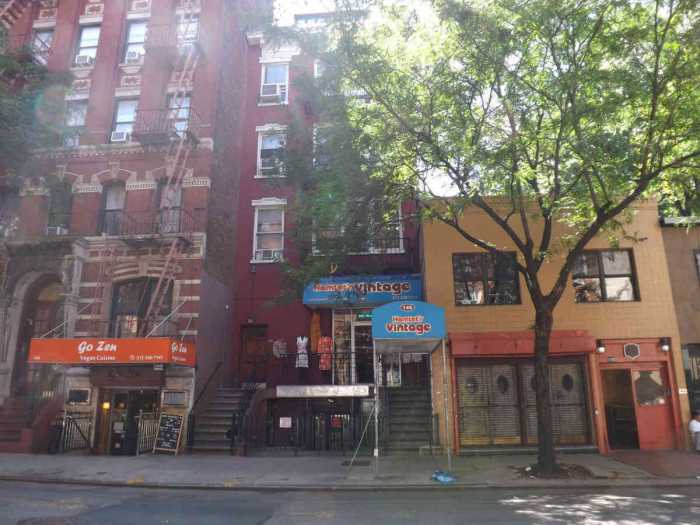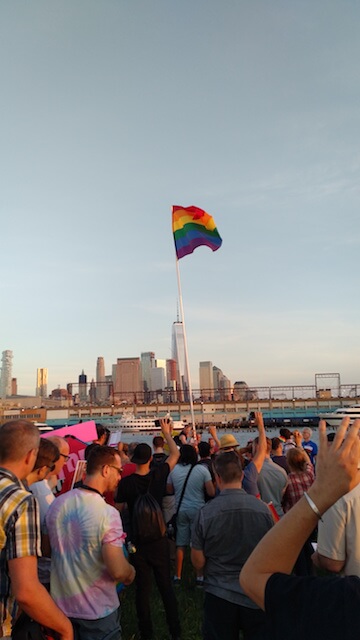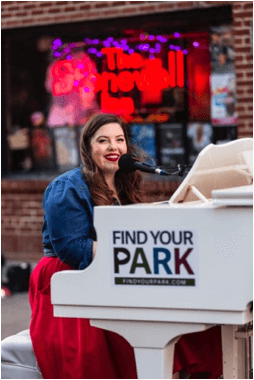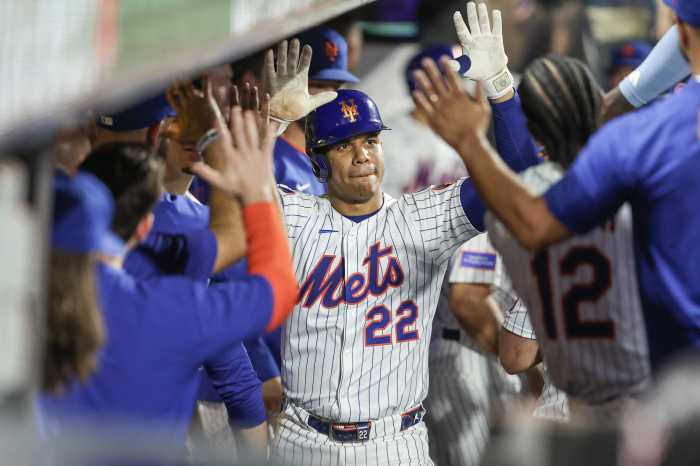New York City First Lady Chirlane McCray at the June 13 Orlando vigil outside the Stonewall Inn. | DONNA ACETO
BY PAUL SCHINDLER | Just one day after a vigil at the Stonewall Inn commemorating those lost in the Orlando gay bar massacre was transformed into a rally calling for more stringent gun control measures nationwide, New York City’s first lady, Chirlane McCray, led off with the same issue in an interview with Gay City News.
“I was thinking last night during the vigil that it would be so wonderful if the next big issue, or one of the next big issues, that the community could take on would be gun safety, or something like that, a thing that is bigger than the community itself in terms of an issue but that would have such resonance and such a deep effect on the community,” McCray said in opening up her remarks at City Hall on June 14.
Before a crowd of several thousands packed into the narrow Christopher Street blocks surrounding the Stonewall the evening before, Governor Andrew Cuomo had touted New York State as a model for tough gun laws, a view echoed by both the leader of New Yorkers Against Gun Violence and the head of the trauma surgery unit at Jacobi Medical Center in the Bronx. Even before anyone spoke, the crowd at the vigil, organized by the Stonewall Democratic Club of New York City, chanted, “What do we want? Gun control. When do we want it? Now?”
Chirlane McCray, citing community’s success in working “the wheels of power,” lauds power in coalitions
Reflecting on “all of that energy” she witnessed at the Stonewall vigil, McCray told Gay City News, “I think of groups that really know to move the wheels… know how to work the wheels of power, and the gay community has been so successful in doing that. There’s already an anti-gun group, and then you get churches involved and the gay community involved, and then you can make some progress.”
That perspective is of a piece not only with the way her husband, Mayor Bill de Blasio, has approached his political career but also with how the couple have worked together during his first term, most notably on the issue of mental health.
In 2009, when de Blasio, then a Brooklyn member of the City Council, was running in a competitive field for city public advocate, he often characterized his skill and experience as an “organizer” as among his key strengths.
For her part, McCray has been a highly active and visible first lady, working out of the mayor’s suite of offices at City Hall. In November, de Blasio and McCray jointly announced the launch of ThriveNYC, described as “mental health roadmap for all, with several dozen new initiatives aimed at creating a more “holistic” approach to public mental health efforts in the city. Just last month, McCray barnstormed church congregations across the five boroughs to enlist faith leaders and their communities in working in a coalition aimed at making the plan a reality.
Asked whether her comments about the gun issue were informed by her thinking and the mayor’s regarding coalition building, she said, “I think it’s the only way you make giant leaps, make real progress. It’s like what we’re trying to do with mental health. It touches on everyone, either directly or indirectly. You can’t just say this is the domain of our public health department — it’s not going to work, we’re not going to get anywhere. It’s really got to bring in everybody, which is what we’re doing.”
And even as McCray sees a crying need for greater gun regulation, she also sees the issue — and the Orlando tragedy — in mental health terms, as well.
“It’s a public health issue that hasn’t been seen through that lens as much as it should be,” she said. “And I think for that reason I would love to see the gay community embrace it. Just as much as I want to see the gay community embracing mental health reform. Both are so important. This young man — how clearly we don’t know, I mean there was no diagnosis of this young man — but we know he abused his wife. We know he was troubled. We know he was not well. And that could have been prevented. He could have been treated, and we would not be here today talking about this, perhaps.”
Beyond the issues of gun control, mental health reform, and building popular support for moving on both fronts, McCray also addressed the responsibilities political leadership has in moving the discussion and providing solutions. On that question, she addressed both the critical election choice facing the nation in November and the influence New York — and by implication, its mayor — can have on shaping the conversation beyond the five boroughs.
“We will be blessed to get Hillary Clinton as president, because I think she will provide leadership that takes us forward,” McCray said. “I don’t know what you do with the Trumps, the Giulianis, who want to stay in the gutter. Clearly they need to be educated because they’re just wrong.”
Dismissive of the presumptive GOP presidential nominee’s obsession over President Barack Obama not using the term “Islamic terrorist” in describing ISIS-inspired attackers, she said, “This is not what this is about. This is not what we need to be discussing.”
She added, “Certainly, leadership’s responsibility is not to be reactive, not to be trading insults. They have to have a high bar and take people forward.”
But in an election in which New York will almost certainly vote Democratic and the race, if it is close, will be decided in states like Ohio, Florida, Virginia, North Carolina, and Iowa, what impact can leaders in New York wield?
“People do look to New York for leadership,” McCray said. “There’s that saying if it can happen in New York, it can happen anywhere, and we’re trying to provide that kind of leadership.”
She then ran through a list of issues where she believes the city is showing leadership — its treatment of transgender school children, universal pre-K, city ID cards to ease the hurdles undocumented immigrants face, job fairs for the LGBT community.
“We’re doing what we say should be done,” McCray said. “So I think that’s the goal of leadership. Not only talk the talk, but walk the walk.”
De Blasio, despite having run against a prominent out lesbian, then-City Council Speaker Christine Quinn, in the 2013 Democratic mayoral primary, actually bested her among LGBT voters and has enjoyed good relations with the community. One area of disagreement, however, has been city support for religious institutions — some of them with a fierce anti-LGBT ideology — whether in making public school space available to them for weekend worship services or in subsidizing their own denominational schools’ security expenses. LGBT critics have been joined by First Amendment advocates in charging that such policies have eroded a necessary principle of church and state separation.
Asked how the city administration can forge conversations with such faith organizations about their hostility to the LGBT community, McCray initially misheard the word “forge” and said, “I think we can’t force those conversations.”
She next emphasized the value of the mayor and his team leading by example.
“I think the things that we do to educate people and raise awareness and to encourage conversations do the most,” she continued. “Showing our openness, showing our willingness to embrace all communities, I think that actually goes a long way to helping those communities that are not as comfortable with it to understand… You lead by demonstrating, by modeling. That’s the most powerful thing we can do.”
In a conversation that focused on a number of very serious topics, McCray’s lightest touch came at the very beginning, in an allusion to her early years in New York, when she dated women and wrote a now famous — then, less so — essay in Essence magazine titled “I Am a Lesbian.” In introducing himself, this reporter referred to New York as the center of LGBT life in America, and McCray responded, “Absolutely. That’s why I came here.” Then, perhaps mindful that as first lady she carries a broader portfolio than that, she quickly added, “I mean, I came here for more than that. I came here to work, in publishing. This is the headquarters of that, too.”
And, then, this: “There’s no place else to be.”

